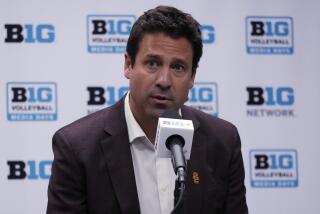May, Walsh Prefer to Play on Foreign Sand
- Share via
To see Misty May and Kerri Walsh play, you’ll need to book a flight to Klagenfurt, Austria.
Or get a hotel room and rent a car in Osaka, Japan.
May and Walsh are one of the top U.S. beach volleyball teams--if not the top U.S. team--but they will not play in the U.S. this season.
They’re young, they’re dynamic and they know how to win, but they’re playing on the international tour because of what May and her agent call a “restrictive” player contract that limits endorsement opportunities for athletes who play in the domestic Assn. of Volleyball Professionals.
May and Walsh are the only top-notch U.S. players--men or women--who did not sign with the AVP this season. They have dominated the international tour, winning tournaments in Spain and Switzerland before finishing fourth Saturday in Norway.
“The AVP wanted the ability to take all the players and give the rights to the [tour] sponsors without the players getting anything,” said Tom McCarthy, May’s agent. “Misty wants to [play], but at the same time, you can’t give the ship away. We can’t give up all the rights the athletes deserve.”
May and Walsh seem perfectly content to play on the Federation Internationale de Volleyball tour, which has been the more stable tour in recent years and offers more tournaments with bigger paydays.
The FIVB also holds the keys to an important process, Olympic qualifying. The only way to qualify for the 2004 Olympics is to earn points in FIVB tournaments over an 18-month time period that will begin early next year. Two teams will qualify from each nation.
May called the AVP contract “limiting,” and said, “We just want to concentrate on the FIVB this year. All the teams you’re going to play [in the Olympics] are here.”
The AVP, on the other hand, has struggled, having declared bankruptcy in November 1998 and only recently showing signs of growth since Leonard Armato purchased the tour last year.
Armato, formerly Shaquille O’Neal’s agent, said it was important for the AVP to defer to sponsors as it tries to restore the high-flying success it experienced in the mid-1990s.
AVP contracts allow players to sign endorsement deals as long as they don’t conflict with a tour sponsor during a tournament. For example, if the AVP is sponsored by a soft drink company, players cannot wear the logo of a different soft drink at tournaments. Players are allowed to wear athletic apparel and sunglasses of their choice at tournaments, even if they conflict with an AVP sponsor.
“It’s critical we deliver ambush protection to sponsors to ensure that they’ll continue to invest in the future of our sport,” Armato said. “Unless there’s a tour that can attract and keep sponsors, this sport will die in this country.”
Armato also said sponsorship opportunities for U.S. players were better if they played in the U.S., even if corporate dollars were fewer in the sagging economy.
“Without being on the AVP tour, there’s no platform for [May and Walsh] in this country,” Armato said. “If they want to be nomads the rest of their lives and travel from country to country, that’s going to be a dead end. They’re going to be at a competitive disadvantage from an athletic and marketing perspective.”
May has an endorsement deal with Oakley and had one with Speedo until its parent company declared bankruptcy last year, McCarthy said.
May, who will be 25 on July 30, was a standout at Newport Harbor High and became national player of the year at Long Beach State in 1997 and 1998. She played briefly for the U.S. indoor national team but left for an immediately successful career on the beach.
Walsh, who will be 24 next month, is in only her second season of pro beach volleyball. As a 6 foot 3 outside hitter at Stanford, she became only the second four-time All-American in the NCAA. Walsh had also been represented by McCarthy but no longer retains his services.
There are more women’s tournaments on the FIVB tour, 11, than in the AVP, seven, and the prize money is better.
May and Walsh split $45,000 after winning the first two FIVB tournaments; the U.S. team of Holly McPeak and Elaine Youngs split $31,900 after winning the first two AVP tournaments at Huntington and Hermosa beaches.
McPeak and Youngs, who also play on the FIVB, won last week’s tournament in Norway. They have won all four AVP tournaments with ease, prompting concerns about a lack of depth in the AVP.
McPeak, who used to be May’s partner, said she doesn’t understand why May and Walsh don’t play on the AVP.
“It’s important we have a strong tour out here,” McPeak said. “We want to be a united front, everybody in it together. I think the fans would like to see [May and Walsh] out here. We’d have great rivalries with each other.”
Until then, the only place the top U.S. teams will face each other is on the FIVB tour.
More to Read
Go beyond the scoreboard
Get the latest on L.A.'s teams in the daily Sports Report newsletter.
You may occasionally receive promotional content from the Los Angeles Times.







